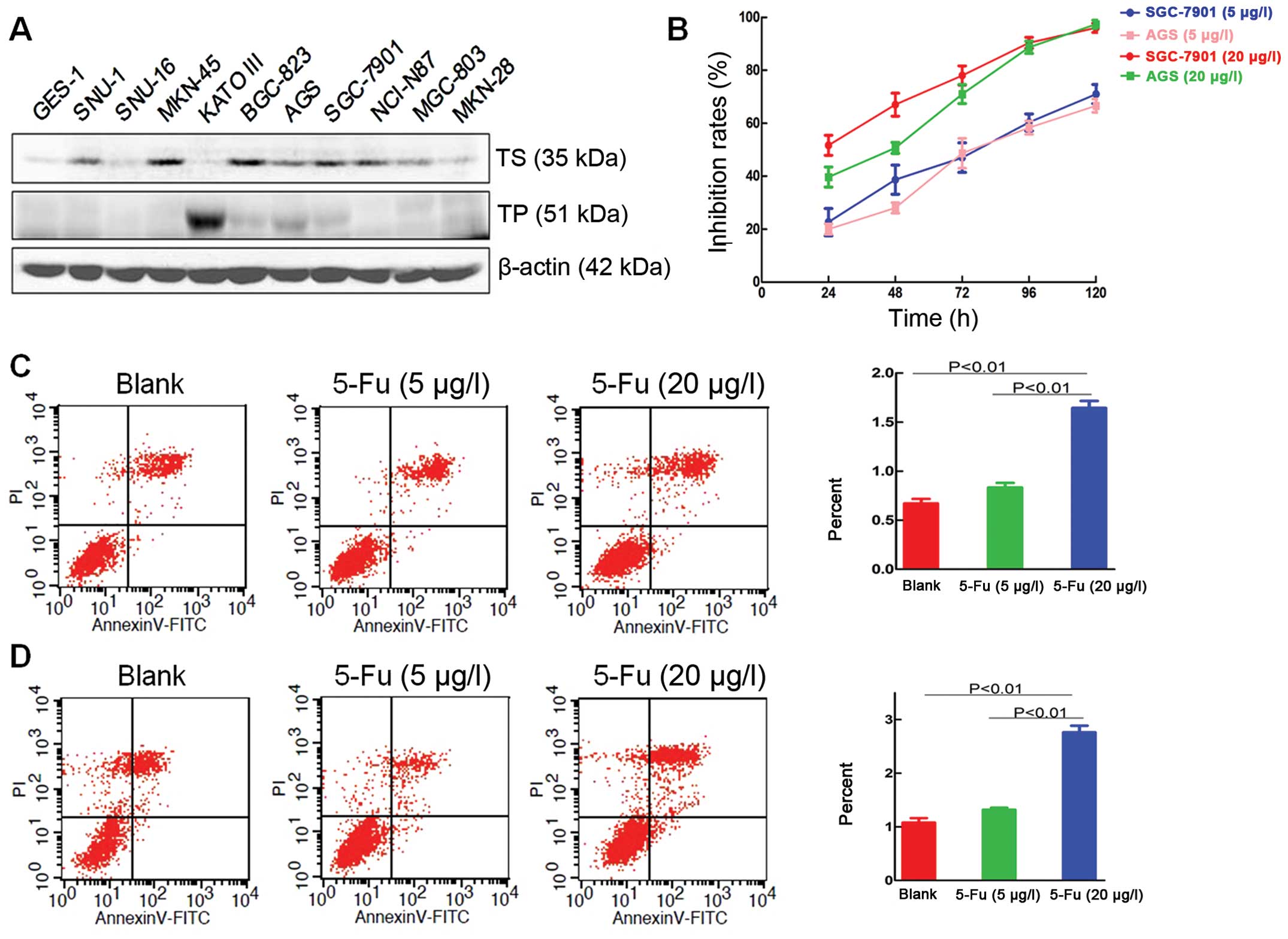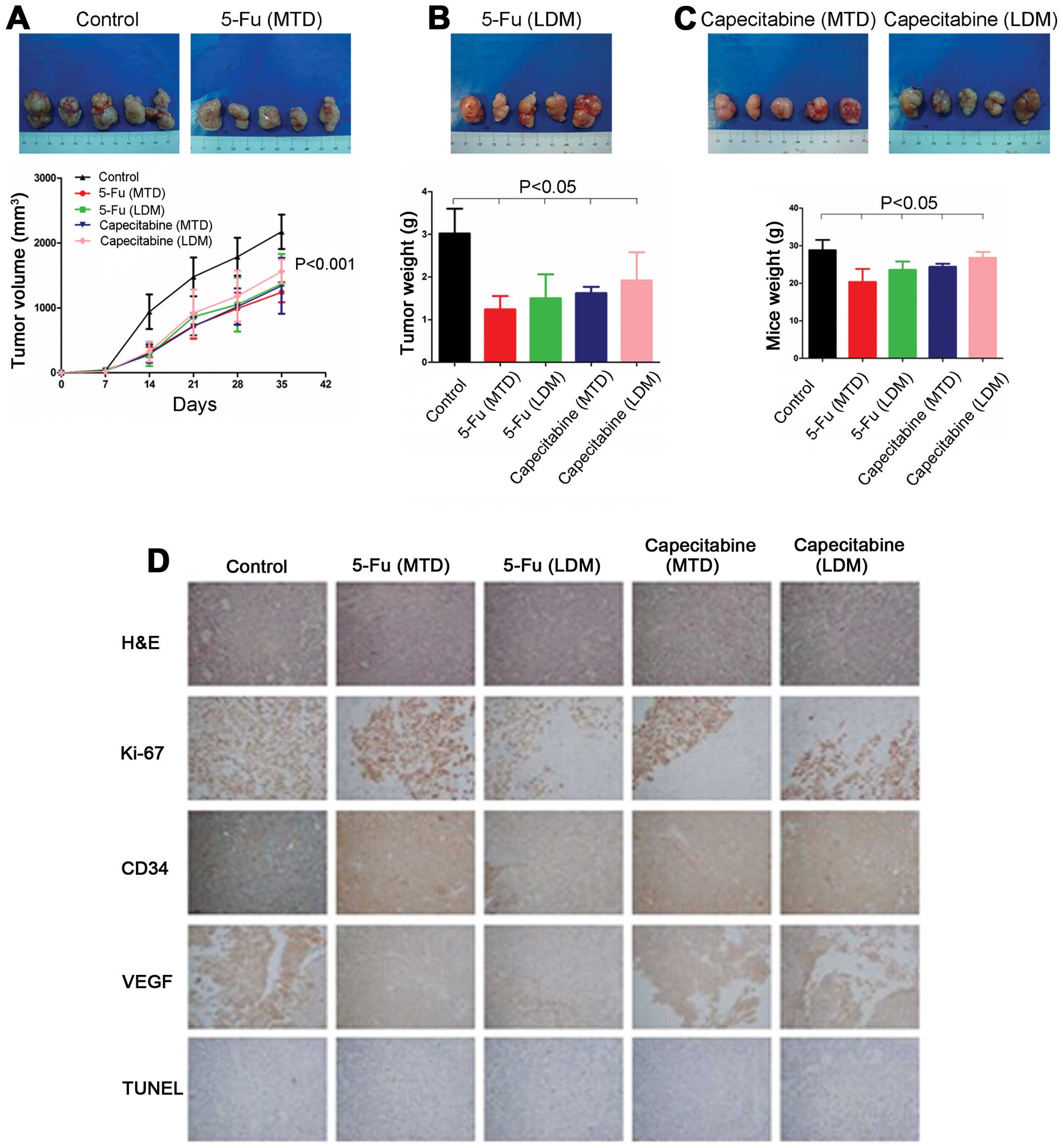|
1
|
Ferlay J, Shin HR, Bray F, Forman D,
Mathers C and Parkin DM: Estimates of worldwide burden of cancer in
2008: GLOBOCAN 2008. Int J Cancer. 127:2893–2917. 2010. View Article : Google Scholar
|
|
2
|
Shah MA and Kelsen DP: Gastric cancer: a
primer on the epidemiology and biology of the disease and an
overview of the medical management of advanced disease. J Natl
Compr Canc Netw. 8:437–447. 2010.PubMed/NCBI
|
|
3
|
Bertolini F, Paul S, Mancuso P, et al:
Maximum tolerable dose and low-dose metronomic chemotherapy have
opposite effects on the mobilization and viability of circulating
endothelial progenitor cells. Cancer Res. 63:4342–4346.
2003.PubMed/NCBI
|
|
4
|
Hanahan D, Bergers G and Bergsland E: Less
is more, regularly: metronomic dosing of cytotoxic drugs can target
tumor angiogenesis in mice. J Clin Invest. 105:1045–1047. 2000.
View Article : Google Scholar : PubMed/NCBI
|
|
5
|
Kamat AA, Kim TJ, Landen CN Jr, et al:
Metronomic chemotherapy enhances the efficacy of antivascular
therapy in ovarian cancer. Cancer Res. 67:281–288. 2007. View Article : Google Scholar : PubMed/NCBI
|
|
6
|
Man S, Bocci G, Francia G, et al:
Antitumor effects in mice of low-dose (metronomic) cyclophosphamide
administered continuously through the drinking water. Cancer Res.
62:2731–2735. 2002.PubMed/NCBI
|
|
7
|
Orlando L, Cardillo A, Ghisini R, et al:
Trastuzumab in combination with metronomic cyclophosphamide and
methotrexate in patients with HER-2 positive metastatic breast
cancer. BMC Cancer. 6:2252006. View Article : Google Scholar : PubMed/NCBI
|
|
8
|
Fakhrejahani E and Toi M: Antiangiogenesis
therapy for breast cancer: an update and perspectives from clinical
trials. Jpn J Clin Oncol. 44:197–207. 2014. View Article : Google Scholar : PubMed/NCBI
|
|
9
|
Shi H, Jiang J, Ji J, et al:
Anti-angiogenesis participates in antitumor effects of metronomic
capecitabine on colon cancer. Cancer Lett. 349:128–135. 2014.
View Article : Google Scholar : PubMed/NCBI
|
|
10
|
Fuchs CS, Tomasek J, Yong CJ, et al:
Ramucirumab monotherapy for previously treated advanced gastric or
gastro-oesophageal junction adenocarcinoma (REGARD): an
international, randomised, multicentre, placebo-controlled, phase 3
trial. Lancet. 383:31–39. 2014. View Article : Google Scholar
|
|
11
|
Ohtsu A, Shah MA, Van Cutsem E, et al:
Bevacizumab in combination with chemotherapy as first-line therapy
in advanced gastric cancer: a randomized, double-blind,
placebo-controlled phase III study. J Clin Oncol. 29:3968–3976.
2011. View Article : Google Scholar : PubMed/NCBI
|
|
12
|
Kang BW, Kim JG, Kwon OK, Chung HY and Yu
W: Non-platinum-based chemotherapy for treatment of advanced
gastric cancer: 5-fluorouracil, taxanes, and irinotecan. World J
Gastroenterol. 20:5396–5402. 2014. View Article : Google Scholar : PubMed/NCBI
|
|
13
|
Cunningham D, Starling N, Rao S, et al:
Capecitabine and oxaliplatin for advanced esophagogastric cancer. N
Engl J Med. 358:36–46. 2008. View Article : Google Scholar : PubMed/NCBI
|
|
14
|
Ryu MH and Kang YK: ML17032 trial:
capecitabine/cisplatin versus 5-fluorouracil/cisplatin as
first-line therapy in advanced gastric cancer. Expert Rev
Anticancer Ther. 9:1745–1751. 2009. View Article : Google Scholar : PubMed/NCBI
|
|
15
|
Bang YJ, Kim YW, Yang HK, et al: Adjuvant
capecitabine and oxaliplatin for gastric cancer after D2
gastrectomy (CLASSIC): a phase 3 open-label, randomised controlled
trial. Lancet. 379:315–321. 2012. View Article : Google Scholar : PubMed/NCBI
|
|
16
|
Lee J, Lim do H, Kim S, et al: Phase III
trial comparing capecitabine plus cisplatin versus capecitabine
plus cisplatin with concurrent capecitabine radiotherapy in
completely resected gastric cancer with D2 lymph node dissection:
the ARTIST trial. J Clin Oncol. 30:268–273. 2012. View Article : Google Scholar
|
|
17
|
Shi M, Lou B, Ji J, et al: Synergistic
antitumor effects of dasatinib and oxaliplatin in gastric cancer
cells. Cancer Chemother Pharmacol. 72:35–44. 2013. View Article : Google Scholar : PubMed/NCBI
|
|
18
|
Kang WK, Park EK, Lee HS, et al: A
biologically active angiogenesis inhibitor, human serum
albumin-TIMP-2 fusion protein, secreted from Saccharomyces
cerevisiae. Protein Expr Purif. 53:331–338. 2007. View Article : Google Scholar : PubMed/NCBI
|
|
19
|
Zhang Q, Kang X, Yang B, Wang J and Yang
F: Antiangiogenic effect of capecitabine combined with ginsenoside
Rg3 on breast cancer in mice. Cancer Biother Radiopharm.
23:647–653. 2008. View Article : Google Scholar : PubMed/NCBI
|
|
20
|
Emoto M, Tachibana K, Iwasaki H and
Kawarabayashi T: Antitumor effect of TNP-470, an angiogenesis
inhibitor, combined with ultrasound irradiation for human uterine
sarcoma xenografts evaluated using contrast color Doppler
ultrasound. Cancer Sci. 98:929–935. 2007. View Article : Google Scholar : PubMed/NCBI
|
|
21
|
Li DH, Pan ZK, Ye F, An HX and Wu JX:
S-1-based versus 5-FU-based chemotherapy as first-line treatment in
advanced gastric cancer: a meta-analysis of randomized controlled
trials. Tumour Biol. 35:8201–8208. 2014. View Article : Google Scholar : PubMed/NCBI
|
|
22
|
Sastre J, Garcia-Saenz JA and Diaz-Rubio
E: Chemotherapy for gastric cancer. World J Gastroenterol.
12:204–213. 2006.PubMed/NCBI
|
|
23
|
Bang YJ: Capecitabine in gastric cancer.
Expert Rev Anticancer Ther. 11:1791–1806. 2011. View Article : Google Scholar : PubMed/NCBI
|
|
24
|
Gasparini G: Metronomic scheduling: the
future of chemotherapy? Lancet Oncol. 2:733–740. 2001. View Article : Google Scholar
|
|
25
|
Loven D, Hasnis E, Bertolini F and Shaked
Y: Low-dose metronomic chemotherapy: from past experience to new
paradigms in the treatment of cancer. Drug Discov Today.
18:193–201. 2013. View Article : Google Scholar
|
|
26
|
Hackl C, Man S, Francia G, Milsom C, Xu P
and Kerbel RS: Metronomic oral topotecan prolongs survival and
reduces liver metastasis in improved preclinical orthotopic and
adjuvant therapy colon cancer models. Gut. 62:259–271. 2013.
View Article : Google Scholar :
|
|
27
|
Mainetti LE, Rico MJ, Fernandez-Zenobi MV,
et al: Therapeutic efficacy of metronomic chemotherapy with
cyclophosphamide and doxorubicin on murine mammary adenocarcinomas.
Ann Oncol. 24:2310–2316. 2013. View Article : Google Scholar : PubMed/NCBI
|
|
28
|
Ng SS, Sparreboom A, Shaked Y, et al:
Influence of formulation vehicle on metronomic taxane chemotherapy:
albumin-bound versus cremophor EL-based paclitaxel. Clin Cancer
Res. 12:4331–4338. 2006. View Article : Google Scholar : PubMed/NCBI
|
|
29
|
Bilici A: Treatment options in patients
with metastatic gastric cancer: current status and future
perspectives. World J Gastroenterol. 20:3905–3915. 2014. View Article : Google Scholar : PubMed/NCBI
|
|
30
|
Gravalos C, Gomez-Martin C, Rivera F, et
al: Phase II study of trastuzumab and cisplatin as first-line
therapy in patients with HER2-positive advanced gastric or
gastroesophageal junction cancer. Clin Transl Oncol. 13:179–184.
2011. View Article : Google Scholar : PubMed/NCBI
|
|
31
|
Guo Z, Wang X, Lin R, et al:
Paclitaxel-based regimens as first-line treatment in advanced
gastric cancer. J Chemother. Feb 18–2014.(Epub ahead of print).
View Article : Google Scholar
|
|
32
|
Wu H, Xin Y, Xu C and Xiao Y: Capecitabine
combined with (−)-epigallocatechin-3-gallate inhibits angiogenesis
and tumor growth in nude mice with gastric cancer xenografts. Exp
Ther Med. 3:650–654. 2012.PubMed/NCBI
|
|
33
|
Fedele P, Marino A, Orlando L, et al:
Efficacy and safety of low-dose metronomic chemotherapy with
capecitabine in heavily pretreated patients with metastatic breast
cancer. Eur J Cancer. 48:24–29. 2012. View Article : Google Scholar
|
|
34
|
Hurwitz H, Fehrenbacher L, Novotny W, et
al: Bevacizumab plus irinotecan, fluorouracil, and leucovorin for
metastatic colorectal cancer. N Engl J Med. 350:2335–2342. 2004.
View Article : Google Scholar : PubMed/NCBI
|
|
35
|
Van Cutsem E, Tabernero J, Lakomy R, et
al: Addition of aflibercept to fluorouracil, leucovorin, and
irinotecan improves survival in a phase III randomized trial in
patients with metastatic colorectal cancer previously treated with
an oxaliplatin-based regimen. J Clin Oncol. 30:3499–3506. 2012.
View Article : Google Scholar : PubMed/NCBI
|
|
36
|
Zhang W, Zhu XD, Sun HC, et al: Depletion
of tumor-associated macrophages enhances the effect of sorafenib in
metastatic liver cancer models by antimetastatic and antiangiogenic
effects. Clin Cancer Res. 16:3420–3430. 2010. View Article : Google Scholar : PubMed/NCBI
|


















